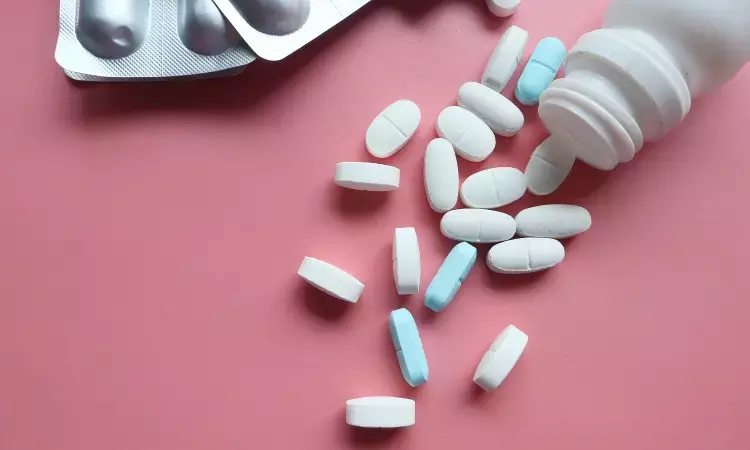- Home
- Medical news & Guidelines
- Anesthesiology
- Cardiology and CTVS
- Critical Care
- Dentistry
- Dermatology
- Diabetes and Endocrinology
- ENT
- Gastroenterology
- Medicine
- Nephrology
- Neurology
- Obstretics-Gynaecology
- Oncology
- Ophthalmology
- Orthopaedics
- Pediatrics-Neonatology
- Psychiatry
- Pulmonology
- Radiology
- Surgery
- Urology
- Laboratory Medicine
- Diet
- Nursing
- Paramedical
- Physiotherapy
- Health news
- Fact Check
- Bone Health Fact Check
- Brain Health Fact Check
- Cancer Related Fact Check
- Child Care Fact Check
- Dental and oral health fact check
- Diabetes and metabolic health fact check
- Diet and Nutrition Fact Check
- Eye and ENT Care Fact Check
- Fitness fact check
- Gut health fact check
- Heart health fact check
- Kidney health fact check
- Medical education fact check
- Men's health fact check
- Respiratory fact check
- Skin and hair care fact check
- Vaccine and Immunization fact check
- Women's health fact check
- AYUSH
- State News
- Andaman and Nicobar Islands
- Andhra Pradesh
- Arunachal Pradesh
- Assam
- Bihar
- Chandigarh
- Chattisgarh
- Dadra and Nagar Haveli
- Daman and Diu
- Delhi
- Goa
- Gujarat
- Haryana
- Himachal Pradesh
- Jammu & Kashmir
- Jharkhand
- Karnataka
- Kerala
- Ladakh
- Lakshadweep
- Madhya Pradesh
- Maharashtra
- Manipur
- Meghalaya
- Mizoram
- Nagaland
- Odisha
- Puducherry
- Punjab
- Rajasthan
- Sikkim
- Tamil Nadu
- Telangana
- Tripura
- Uttar Pradesh
- Uttrakhand
- West Bengal
- Medical Education
- Industry
Ex-Pharma CEO aided opioid sales to addicts, US says

New Delhi: The former head of a major generic drug distributor directed U.S. sales of opioids to pharmacies despite "serious red flags" that the powerful medications were being illegally diverted to street dealers and addicts, a prosecutor told jurors at the start of a criminal trial in Manhattan.
Laurence F. Doud III, who spent 25 years as chief executive officer of Rochester Drug Co-operative, is accused of scheming with others at the company to distribute high volumes of addictive oxycodone and fentanyl to pharmacies that had been flagged for questionable practices and preventing reporting them to the government. Doud, 78, faces from 10 years to life in prison if convicted.
"He and the people who worked for him shipped the opioids knowing that some of those pharmacies were selling them illegally, and turning a blind eye to clear signs that others were breaking the law," Assistant U.S. Attorney Thomas Burnett told jurors Tuesday in his opening statement. "Then he had his employees lie to the government about what they were doing."
Doud evaded the rules in order to boost the company's sales and his own pay, Burnett said.
While other pharmaceutical executives have faced criminal charges stemming from the opioid epidemic, including many at Insys Therapeutics Inc., Doud is the first to be charged with diverting the painkillers. He faces a single charge of conspiracy to distribute controlled substances and conspiring to defraud the U.S. government by failing to report suspicious orders to the Drug Enforcement Administration.
"Larry Doud is falsely accused of the charged crimes in this case," Derrelle Janey, one of his lawyers, said in his opening statement.
Janey told jurors they will hear evidence that Doud directed employees and consultants to investigate companies that had signs of suspicious opioid sales. His bonuses from the company were driven by the sale of non-controlled drugs, such as the cholesterol drug Lipitor, and albuterol, which is used to treat asthma and other breathing problems, not opioids, Janey said.
He told jurors that Rochester Drug's compliance program wasn't perfect, but it was no "sham or front" to sell drugs illegally.
Reporting Obligation
The government's first witness was a former DEA investigator who told jurors that companies are required to watch customer pharmacies for red flags of illegality. That includes any high-volume opioid sales, cash purchases for more than 10% of transactions, an unusually large proportion of high-dosage orders and repeated opioid prescriptions from a small number of doctors, she said.
"They do have to maintain effective controls against diversion," the witness, Ruth Carter, testified.
The cooperative, which was formed in 1905, was once the sixth-largest pharmaceutical distributor in the U.S. It agreed to pay $20 million to resolve narcotic conspiracy charges on the same day that Doud surrendered to authorities. The company filed for bankruptcy in March 2020, listing assets of more than $50 million and debt of more than $100 million.
The company's chief compliance officer, William Pietruszewski, pleaded guilty in April 2019 and has agreed to cooperate with prosecutors.
John Kapoor, the Insys founder, was convicted of a racketeering scheme featuring sham speakers' fees for doctors who ramped up prescriptions of Subsys, the company's opioid-based pain medicine. He was sentenced in January 2020 to 5 1/2 years in prison.
The case is: U.S. v. Doud, 19-cr-00285, U.S. District Court, Southern District of New York (Manhattan)
Ruchika Sharma joined Medical Dialogue as an Correspondent for the Business Section in 2019. She covers all the updates in the Pharmaceutical field, Policy, Insurance, Business Healthcare, Medical News, Health News, Pharma News, Healthcare and Investment. She has completed her B.Com from Delhi University and then pursued postgraduation in M.Com. She can be contacted at editorial@medicaldialogues.in Contact no. 011-43720751


